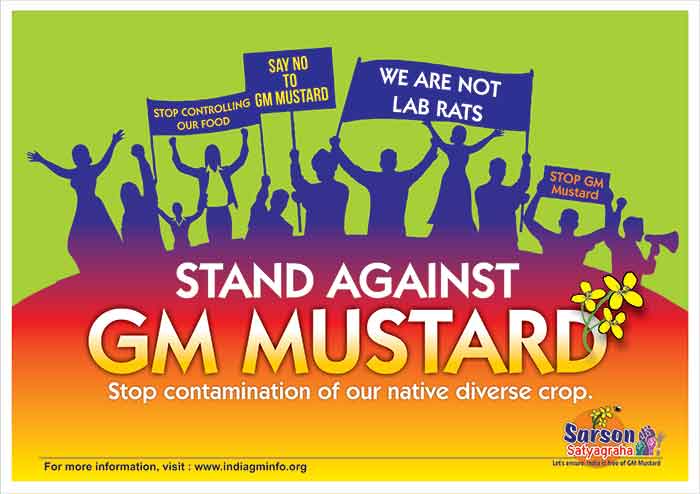
The shadow of climate change related problems hangs heavy over most farmers as they struggle increasingly against unexpected weather conditions, extreme weather events and disasters. In such conditions it is very important for government policy to avoid any changes that can aggravate such difficulties and problems faced by farmers. Hence it is very unfortunate to see some authorities bent upon spreading GM crops even in these conditions, despite the well-established fact that GM crops aggravate the problems and difficulties relating to climate change.
In a letter written to the Prime Minister of India in 2009 at the height of the Bt brinjal debate, as many as 17 distinguished scientists from the USA, Canada, Europe and New Zealand pointed out that the claims relating to higher yield and protection of environment made for GM crops are absolutely false. Due to various problems of GM crops, their spread has been highly limited. This letter says, “More than 95 percent of all GM crops are engineered to either synthesize an insecticide (Bt toxin) or to tolerate a broad spectrum herbicide (e.g. Roundup, Liberty) or both.
“…The basic problem is that GM as employed in agriculture is conceptually flawed, crude, imprecise and poorly controlled technology, that is incapable of generating plants that contain the required multiple, co-ordinately regulated genes that work in an integrated way to respond to environmental challenges.
“…GM has not increased yield potential. Yields from GM crops to date have been no better and in the case of GM soya have been consistently lower…GM crops have led to vast increases in pesticide use, not decreases and therefore reduction of agricultural pollution cannot be claimed.
“…Climate change brings sudden, extreme, and unpredictable changes in weather, which requires that a cropping system be flexible, resilient and as genetically diverse as possible. GM technology offers just the opposite.
“…Stability of productivity and production is much lower with many of the GM crops commercialized today. Herbicide tolerant GM soya is far more sensitive to heat or drought stress than conventional soya.
“…GM crops are designed to be used in conjunction with synthetic pesticides and fertilizers, which are manufactured from oil and natural gas.
“GM crops do not reduce greenhouse gas emissions.
“Recent data from the US department of agriculture has shown a vast increase in herbicide use since the introduction of GM crops tolerant to the application of these agrochemicals.
“Therefore, the introduction of GM crops has exacerbated rather than reduced agriculture’s carbon footprint and is clearly unsustainable.
“Alternative proven technologies that can reduce the amount of fossil fuel used in farming already exist. This includes methods for reducing fertilizer applications, selecting farm machinery appropriate for each task, managing soil for conservation, limiting irrigation and (using) agro-ecological farming techniques.”
While the record of GM and particularly bt varieties in increasing yields on a sustainable basis is highly suspect, safer alternatives are certainly available. As Prof. P.M. Bhargava, noted molecular biologist pointed out recently, the Indian Council of Agricultural Research had not only favorably tested Integrated Pest Management and bio-pesticides on 85 crops but also compiled as many as 4000 traditional agricultural practices of which several had been validated and revalidated. Giving the example of Andhra Pradesh where at least one lakh acres were then under organic farming he said the yields here are equal to those farms of Punjab and Maharashtra where Bt varieties are being grown.
While decentralized farm policies are always good, these are all the more so in times of climate change when weather becomes more uncertain, the phenomenon of freak weather is often seen and weather conditions even within a small region may differ. Hence farmers should be in a better position to make changes in farm decisions in rapidly changing conditions on their own instead of relying on over-centralized systems which may not be in a position to respond to their specific needs, or else their response may be too delayed, or else their response may be influenced by commercial considerations of corporate interests. GM crops being part of highly centralized systems controlled generally by multinational companies and their affiliates are ill suited for times of climate change.
One of the main problems for farmers, particularly small and medium farmers, which has led to crisis conditions and indebtedness relates to imposition of expensive technologies requiring high input expenses and disrupting their practices of higher self-reliance. This trend can increase greatly further with the spread of GM crops as this is a technology controlled by multinational companies which try to impose expensive seeds and agro-chemicals as a package involving patents and high profits. There is hardly any escape for farmers who get caught in this system of high costs and debts.
Hence while the case against GM crops in any case is very strong, it becomes even stronger when examined in the context of climate change. The entire system of GM cops is a system of heavy dependence for farmers, that too on corporate interests for fleecing farmers. Instead what farmers really need are systems of increasing self-reliance of farming communities, a requirement highly compatible with systems of agro-ecology.
Bharat Dogra is Honorary Convener, Campaign to Save Earth Now. His recent books include Planet in Peril, Protecting Earth for Children and India’s Quest for Sustainable Farming and Healthy Food.













































